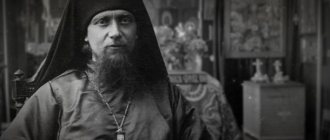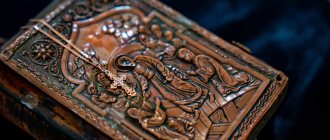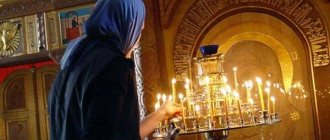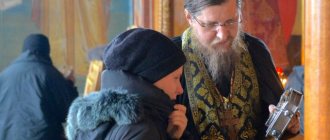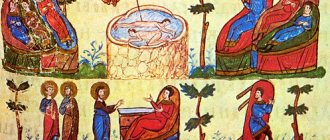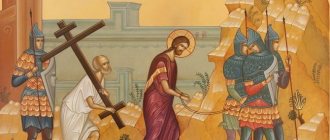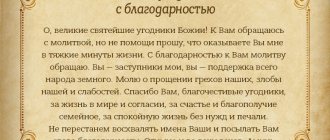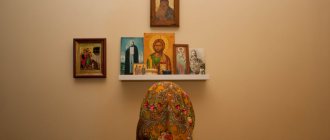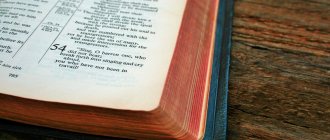Login to the site
Prot. Dimitry Smirnov:Actually, to be honest, it says “let him praise the Lord,” but the meaning does not change because our Lord is our God.
“Every breath” refers to every creation of God. All the creatures of God that breathe - birds, amphibians, animals, and plants, because everything that God created, He created for His glory.
God for us, His creations, is absolutely invisible and incomprehensible, which is expressed in these words: “No one has seen God anywhere” (John 1:18).
But we can observe the greatness of God in His creation. We see the tit, its beauty - and praise God.
And the tit, chirping, praises God. And so is every living being.
A beautiful shell glorifies its Creator, because the mollusk does not have a developed brain; it could not create such a structure itself. This is the Lord.
Or the structure of a hive - an insect, a bee, cannot create it, God created it. And the beehive with its most intelligent structure glorifies God. All fish and all animals praise God. Every breath glorifies the Lord by its existence.
And God desires that a person who has been given the great gift of reason, speech, marriage, the ability to know God, through religion, which God also gave to man, glorify God through shame and conscience.
This is a call to all creation.
But, of course, it is not only creatures that are living beings who glorify God. The mountains, as has been said, and the rivers and seas praise God. So everything created by God praises Him.
The universe especially praises God.
Anyone who looks at the sky can feel this, seeing its bottomless size and absolutely divine beauty - especially in our nature and region, this is the August night, which shows us the greatness of God the Creator.
I remember, as a small child of about five years old, the sight of the sky put me in such a state that I still remember this event when I paid attention to it.
Since then I have been under this impression and, when I find myself in front of a clear sky dotted with stars, I remember this childhood impression, and it continues to affect me.
Volcanoes also praise God, now Etna is erupting. What kind of energy power is concentrated inside our planet, and how did God arrange that the earth’s crust holds this power within itself, and only at certain points shows us what is inside - such temperatures that we can only reproduce for a few seconds with the help of our technology. But for God this is not something transcendental. Real plasma is very close, and the Lord will protect us. Prot. Alexander Berezovsky: And God’s highest creation – man – falls out of this common orchestra. Prot. Dimitry Smirnov: Yes, a person has a journey ahead of him. He must use the precious gift of freedom in order to also glorify God with his life. So that people see a person’s good deeds and glorify the Heavenly Father. ……………………………………. Answer: Father Dimitry Smirnov
“Let all people sing a song of victory...”
Immediately after the 50th psalm, the first irmos of the morning canon is sung.
Translated from Greek, the word “canon” means “rule”. This is a special genre of church hymnography, a complex multi-stanza work dedicated to the glorification of a holiday or saint. Among the first creators of the canons, history names St. Andrew of Crete, to whom the Great Penitential Canon belongs, and St. John of Damascus, the author of a huge number of liturgical texts that have survived to this day. The canon consists of several songs: there may be 2, 3, 4, 8, 9, but usually on weekdays it includes 8 songs (the 2nd song is missing, it is present only in some canons of the Lenten period), each of which contains a number of troparia and is preceded by the singing of the Irmos. Irmos in Greek means connection; This is the first stanza of the song of the canon, which in Byzantine examples also served as a melodic model for its troparions. In Greece, the canons are still sung to this day, according to ancient tradition. For the Russian Church, the replacement of singing with reading is typical, with the exception, perhaps, of the Easter canon, when at the service nothing is read at all, but everything is just sung.
Almost always at Matins, not one canon is read, but several are combined (on weekdays - no more than three, on Sundays and holidays - no more than four). The irmos of the first canon in order is sung, and then the troparia of the combined canons are read. According to the Charter, the canon is most often read “on 14”, sometimes “on 16” (with the corresponding number of troparia), but in reality today the canons are read “on 8”, and “on 6”, and even “on 4”.
For the “classical” canon, written according to all the rules of hymnography, the theme of each of its songs is set by the corresponding “biblical songs”. So, for example, the first biblical song is the song of the prophet Moses, after the Jews crossed the Red Sea, the second is his song before his death, the third is Anna’s song about the birth of her son Samuel, the fourth is the song of the prophet Habakkuk, glorifying the Lord, etc. In ancient times, they were read or sung along with the songs of the canon, preceding them, but now, as a rule, they are used only during Lenten services, as well as in some monastic monasteries. Actually, the irmos in its meaning was a kind of semantic connection between the songs of the Holy Scriptures and the main theme of the canon, expressed in the troparia. Since Irmos are often repeated in everyday worship, their words are well known to many believers: “I will open my mouth and be filled with the Spirit...”, “Let all people sing a song of victory...”, “Christ is born, give thanks...”, etc.
In modern liturgical practice, the place of biblical songs has been taken by choruses - laudatory or prayerful appeals to the Lord, the Mother of God, the saints of God, preceding the reading of each troparion. For example: “Glory, Lord, to your holy resurrection”, “Glory to you, our God, glory to you”, “Most Holy Theotokos, save us”, “St. Father Nicholas, pray to God for us” and others.
After the 3rd, 6th and 9th songs of the canon, small litanies are placed (“Let us pray again and again in peace to the Lord”). These songs are “covered” (that is, completed) by the singing of the Irmos of the last of the canons laid down for this day. Irmos, with which the song ends, is called the word “katavasia,” which translated from Greek means “convergence.” In ancient times, singing “in two faces” was widespread, that is, in two choirs or choirs, and to sing the irmos that concludes the song, they came together, which is where this word comes from.
After the litany for the 3rd song, the sedalen (troparion, during the reading of which one is allowed to sit) or ipakoi (from the Greek word “I listen,” which indicates the special attention with which this chant should be treated) is usually read. After the litany of the 6th - kontakion and ikos of a holiday or saint (initially the word “kontakion” was the name for a separate genre of church Byzantine hymnography, now supplanted from worship by the canon; kontakia in ancient times were multi-stanza poems, and the modern “kontakion” and ikos are, according to essentially, its stanzas).
According to the 8th canto, katavasia is also sung and after it, the priest or deacon, if he is participating in the service, standing in front of the local icon of the Mother of God in the iconostasis and drawing a cross in the air with a censer, solemnly proclaims: “Let us exalt the Mother of God and the Mother of Light with songs.” The choir then sings the song of the Theotokos “My soul magnifies the Lord...” (Luke 1:46-55) with the chorus “The most honorable cherub...”, during which a full censing of the temple and all those praying in it is performed.
According to the 9th canon, the small litany again sounds and the luminary is read or sung, a short variable chant, related in content to the read canon (since Matins was previously performed in the early, predawn time, it is natural to interpret such a name for the chant as an indication of the gradually approaching dawn). Sometimes this chant is also called “exapostilary,” which means “I send” in Greek. This is also the case (as with katavasiya) when a chant gets its name not so much from its content as from the method of execution: previously, when the service was of a more strictly statutory nature, the singer appointed to sing it was sent from the choir to the middle of the church. The exapostilaria include such well-known hymns of Holy Week as “I see Your palace, O my Savior” or “The prudent thief.” It must be said, however, that in some churches, especially well-appointed monasteries, the tradition of singing these exapostilarii by a singer in the middle of the church, and not on the choir, is maintained today.
Let every breath praise the Lord
Recently, the editor of a book collecting evidence for the existence of God asked me if I had any thoughts on this matter. There is more than enough evidence: both theological and scientific, but, obviously, writers must have some special revelations of their own, which people who do not belong to the writing guild have not yet thought of. I apologized, saying that I couldn’t tell anything original. But, as soon as he said “have me renounced,” he immediately began to reflect on the given topic and remembered several stories about how educated and creative people, as well as those who were not creative or not bookish, talked about God with those who tried to convince them is that there is no God.
Those who have had a personal encounter with God do not need any evidence
Evidence... Those who have had a personal meeting with God do not need any evidence. Everything is clear with theologians. But with scientists and those who believe in science, it’s more complicated. If Pascal and Newton were theologians, and Darwin (even after the story with the monkey) did not cease to believe in God, then his adherents made him an “apostle of godlessness.” Atheism became fashionable, and in the scientific community, the absolute majority was instilled with a new faith - the belief that faith in God is a sign of backwardness and ignorance, incompatible with the title of a real scientist.
Atheist credo: “Science has proven that there is no God, and what it cannot explain now will certainly soon be able to explain.” After all, it moves forward along with progress and will explain everything over time.”
But in the middle of the 20th century, American biologists Watson and Crick made an incredible discovery: DNA molecules are carriers of genetic information about the heredity and characteristics of a living organism. This is text. Who wrote it? Every text has an author. It became clear to many who this Author was. But still, the majority of scientists remained faithful to materialism and continue to vehemently reject the very idea of the existence of a Creator. Hypotheses are put forward, presented almost in the form of laws, about self-generating and self-developing structures. For some reason, they are silent about the fact that all this “self-emerging” does not lead to any complex development. On the contrary, we see an ever-increasing degradation of everything and everyone. But the hypothesis about the origin of man from the ape can be accepted exactly the opposite. Before our eyes, many representatives of Homo sapiens are becoming ape-like lustful creatures with the antics and intelligence of a supposed ancestor, losing the ability to think and express what can hardly be called thoughts.
Watching the discussion between creationists and materialists, you understand that the latter simply remain faithful to the order not to recognize God in any way. They don't want God. For sensible people, it is clear that the countless hypotheses they create are just a smoke screen behind which they hide the obligation to fight the Lord God to the end.
If they do not accept any reasons of theologians in principle, then the sound ideas of their colleagues in the scientific workshop are either suppressed or ridiculed.
I recently learned that the American scientist Peter Stone has come up with an original way to prove that Jesus Christ is the Messiah and the Son of God. He studied 456 fulfilled Old Testament prophecies about Christ and selected 8:
- Birthplace of the Messiah.
- The sermon of the prophet sent before Him (John the Baptist).
- Entering Jerusalem on a donkey.
- Betrayal by His closest disciple.
- The fee for betrayal is 30 pieces of silver.
- Money for betrayal will be thrown in the temple.
- The Messiah will remain silent before his accusers.
- He will be crucified.
Using probability theory and modern calculation methods, he found that the chances of these eight prophecies being fulfilled on one person are equal to 10 to the minus 17th power. For clarity, for his fellow American citizens who highly respect their banknotes, he explained what this means: “If you cover the entire territory of the state of Texas with a layer of 60 cm with one-dollar coins, and then blindfolded try to find a single coin...”. And since, despite all the improbability, everything was exactly fulfilled, as was said by the prophets about the Messiah, then... (think, gentlemen atheists).
I am afraid that the debate between creationists and materialists will continue until the end of time. For those who do not want to see the Truth, it is impossible to prove even what is obvious from the point of view of common sense. This means that there is no need to prove anything, especially since the famous Mr. Gödel states in his theorem: no evidence can prove anything and is itself unprovable.
For those who do not want to see the Truth, it is impossible to prove even what is obvious from the point of view of common sense
I’d rather tell you a few funny stories about how people who are far from modern science talk about God.
A resident of the Tver village, Baba Panya, sits on a rubble with her neighbor, a tractor driver, and he scolds her for going to church in the regional center.
- What, Panya, didn’t you see in this church? Are you shaking on the train or on the bus for 20 miles early in the morning? It would be better if I slept better on Sunday. Everyone knows that there is no God.
- Wow, there are drunken tractor drivers, but there is no God?!
- Here I am, sitting with you. Can you see me. Who has ever seen God?
“I see and hear him with my heart.” Before I even have time to do anything bad, he tells me: “Don’t do this, Panechka, don’t do it.” Right now I want to hit you in the face with a rag so that you don’t blaspheme, but He says to me: “No need, Panechka, what will you take from him?! You’d better go to the hut, out of harm’s way.” I'll go. Conscience in me is the voice of God. And you, drunkards, have drunk your conscience away, and that is why you do not feel God.
She said to her grandson, who had entered the institute, and was trying to turn her away from the faith: “When your science makes a machine into which they put hay, and milk flows out of it, like from our little cow, then I will believe your science.” I witnessed this conversation and asked the young man to trace the evolutionary chain from the cosmic dust of the First Explosion to the most seedy Burenka (even the one that milks less than a goat).
He referred to the fact that he was still only a first-year student, and promised to continue the conversation in 5 years, when he becomes a scientist. I don’t know what kind of scientist he became, but after 3 years he completely stopped coming to the one who raised him and fed him from the cradle. Baba Panya lived after that conversation for another 10 years and ended her days in a nursing home, where she fought off unbelieving neighbors, orderlies and nurses until her death. When I visited her shortly before her death, she, sitting on the bed in a sweatshirt and felt boots, deftly fought off a nurse dressed in a faux fur coat (then there was almost no drowning at all).
– What should I, Galya, talk to you about God? Here I am in fufan. It is sewn from natural fabric. Both natural cotton wool and wool in felt boots - everything is made from what God created. I'm warm too. And you’re wearing a short fur coat made from oil (or some other chemical). There is little heat in it, but electricity... Look how sparks fall from it when you take it off, pure fireworks - even plug in Ilyich’s light bulb. You, who wear such fur coats, can be used instead of the Dnieper Hydroelectric Power Station...
This is how the theological conversation turned out.
About 30 years ago, an elderly Tajik told me why he believes in God.
“We had such a case in our village.” A snake crawled to my neighbors house. Huge - more than a meter. All wounded. The eagle tore it with its claws. She lay down at the threshold. The owner wanted to kill her, but his wife persuaded her not to kill her. I poured milk into her bowl. I started feeding. The snake settled under the stairs and did not crawl anywhere, and drove away other snakes. And we have a lot of this goodness. One day the neighbors went up the mountain to mow. The snake is behind them. They hung their child in a cradle on a tree and mowed it down. And the child kicked and fell out of the cradle. I rolled down the slope, and there it was not far from the cliff. So the snake caught up with him, wrapped it around him, grabbed the root of some bush with its teeth and held him for a long time on the edge of the cliff, until his mother and father came running to the cry. Who taught this snake this? Instinct, would you say? There is no such instinct to save children who have fallen out of the cradle. And I’ll tell you, God can even send a snake to save you!
This story is incredible. It is difficult for even a believer to believe in it. But the narrator was a communist and the chairman of a collective farm. There was no way he would lie, since this public was strictly forbidden to believe in God. He told me this in great confidence.
To an open-minded person, everything around us speaks of God's greatness
To an open-minded person, everything around us speaks of God's greatness. Even television programs about nature: about millions of species of birds, animals, fish and flowers - can convince you that the world was created by a Great Creator with an incomprehensible artistic taste and “engineering genius.” May the Lord forgive me for these poor words, unable to reflect the depth of admiration for the beauties of God's world. You can spend hours looking at the raging sea, at the sunset, at the fire of the fire, at the mountains covered with snow, at the steppe in the bright lights of blooming poppies, at the blossoming apple and cherry trees, at the fast mountain rivers and the slow waters of wide lowland rivers. No matter where you look, there is evidence of God's work. And every breath praises the Lord! And how the tiny nightingale praises Him, singing without recharging all night long! And the forests and oak groves rustling under the strong wind! And the meadows in the river valleys! What kind of artist would be able to decorate green grass with thousands of different colors like that... You’ll admire it, look up, and there such pictures of white clouds drawn across the blue sky will take your breath away! And then suddenly a menacing color will swirl and fall, and it’s no longer azure above you, but a black-blue gloom. And from it - cranked arrows of lightning, and thunder - thousands of guns cannot thunder like that...
This is probably not exactly what the editor asked me to do. Many will say that these stories about the faith of uneducated people in God are not proof! So Gödel says that nothing can be proven...
Eh, gentlemen, atheists, where have you lost your heart, capable of feeling the One who called you from oblivion?! We are poor, poor...

